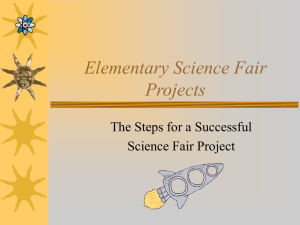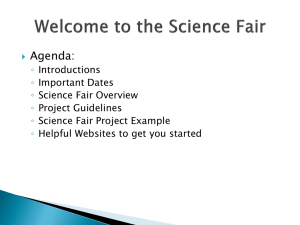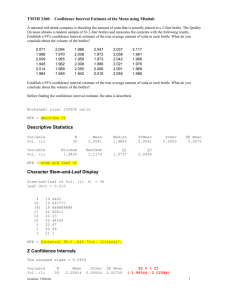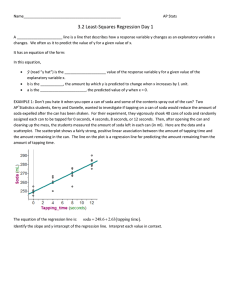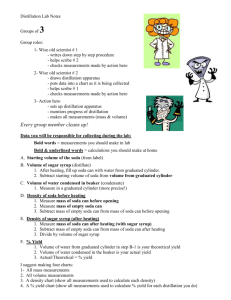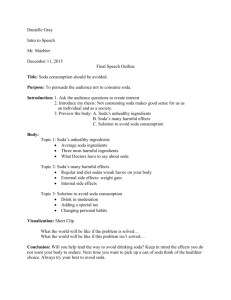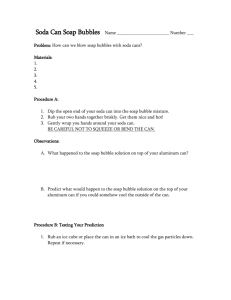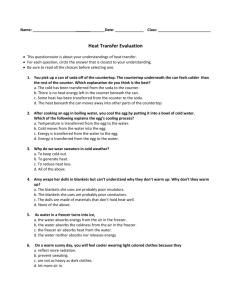Elementary Science Fair Projects
advertisement
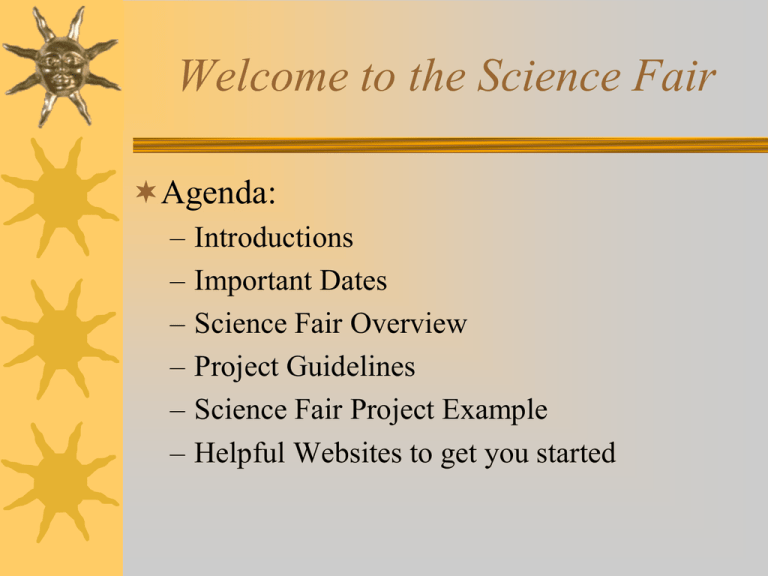
Welcome to the Science Fair Agenda: – – – – – – Introductions Important Dates Science Fair Overview Project Guidelines Science Fair Project Example Helpful Websites to get you started Introductions and Contact Information Ms. Colleen Simone, Science Fair Coordinator, simonec@citrus.k12.fl.us or by phone, 795-2211 Mr. Mulder, assistant principal Mrs. Glenn, Mr. Mitchell, Mrs. Kassay, Ms. Spires, and Mrs. Hackey Important Dates To Remember Project Proposal to Teacher due by October 7, 2011 (the sooner you get it in to be approved, the sooner you can start) Science Fair Projects Due to School: November 8, 2011 School Science Fair Date: November 15, 2011 Regional Science and Engineering Fair Date: December 7th, 2011 at Citrus County Auditorium RSEF Awards Ceremony Date: December 12, 2011 at Curtis Peterson Auditorium Elementary Science Fair Projects The Steps for a Successful Science Fair Project The Scientific Method You should always follow the 9 steps of the scientific method when doing a science project to be successful. Step 1 – Select a Topic A. Student What is my interest? Selected Topic B. Parent Will I be able to help? C. Teacher Is the project on level? SCIENCE FAIR REGISTRATION Title of Project:___________________________________________________________ Student name(s):__________________________________________________________ __________________________________________________________ Teacher:__________________________________________________ Brief description of project: ____________________________________________________________ ____________________________________________________________ ____________________________________________________________ ____________________________________________________________ ____________________________________________________________ ____________________________________________________________ **I have discussed the purpose and procedures of the school science fair with this student. Teacher’s Signature:_____________________________________________________ **I have read the school science fair guidelines with my child and approve of his/her intended project. Parent’s Signature:_______________________________________________________ Date: _________________________Phone :__________________ The deadline for submitting this registration to your teacher is October 7, 2011. Step 1A: Select a Topic - Student What are my interests? What would I like to learn about? Do I have a question about something? Where to look for topics? Science Fair books Internet Teacher Does my project meet the rule requirements? Step 1B: Select Topic - Parent Should I help with the selected topic? Does the selected project meet the rule requirements? Do we have the needed materials for the project or know where to purchase or borrow? Do we have a timeline for the experiment to be done on time? Is my child meeting the deadlines of the teacher? How should I help to put the research paper and display board together? Step 1 C: Select Topic - Teacher Is the project at the student’s ability level? Does the project meet the rule requirements? Is there parent approval? What is the timeline for each step? Locate needed resources for students. Are the students meeting the timelines? Data/Project Log - REQUIRED The log starts on the date you select and it is approved by the teacher Each new entry must be dated This log is HANDWRITTEN – not typedin a notebook ALL observations and measurements are to be recorded Remember all measurements are metric Step 2 Identify the Problem This is a sentence or question about the problem. Example: What type of container will keep my soda cooler longer? Or I would like to compare the temperature of a glass bottle of soda to a can of soda. Step 3 Collect Background Information BOOKS: Encyclopedias Topic Books Magazines/Newspapers RESEARCH about Project Media Center Minimum of 5 references INTERNET: Websites Search by Topic CD ROM: Grolier Compton Research Notebook - REQUIRED Must be written in your own words. Do not just print the pages from the computer. – – – – – – Research your topic in books and online Make notes as you do the research Paraphrase what you read in your OWN words Research paper may be typed or handwritten You are to have a minimum of five sources Must list your sources in the bibliography in the correct format Step 4 Form a Hypothesis A hypothesis is a statement of what you believe will happen in the experiment. This statement is based on the research you have done. Do not start with “I think.” Examples: “The can will keep the soda cooler longer than the plastic or glass bottle.” OR “If soda is placed in can, then the soda will stay cooler longer than in plastic or glass.” Step 5 Design an Experiment Materials List: All materials needed to conduct the experiment: Paper Pencil Ruler Measuring cup Etc. Procedure: The procedure is a step by step set of directions on how to do the experiment. Remember to use are metrics. Step 1 – gather all materials Step 2 – explain how to set up experiment Etc. Step 6 During Experiment Observe: Watch Look During the Experiment Record: Notes Journal/Log Results Analyze Data: What have I learned from the results? Step 7 Repeat the Experiment The experiment is to be repeated at least 3 times. This is done in order to prove the results as true. Step 8 Drawing A Conclusion This is a sentence or sentences that state what did happen during the experiment. What did you learn from the experiment? Example: The can kept the soda cooler longer than the glass bottle. Step 9 Application What could the results be used for? How could I use the knowledge I have gained from the experiment? How will I use what I have learned? How could others use the information I have gained from the experiment? Guidelines for Elementary Projects Review of the Elementary Science Fair Projects Guidelines Sheet Science Fair Rubric Title_____________________________________________ Okay Weak 10 Good Point Value Strong _________________________________________ __________________________________________ __________________________________________ Outstanding Name(s) NUMBER_________ 8 6 4 2 Visual Presentation 1. Project is neat, clear, complete, creative, appealing and has a title 2. Abstract 150 words or less Scientific Thought 3. 4. 5. 6. 7. 8. Clear and specific Purpose (Is a scientific question asked?) Clear and specific Hypothesis (Is it measurable?) Complete and thorough Materials list, including reference materials Complete and thorough Procedure (include variables, step by step) Complete and thorough Observations (logs, graphs, tables, photos…) Complete analysis –student has tested 3 times / trials and data is verified for each trial or shows averaged results 9. Conclusion supported by data, written clearly and logically Clarity and Thoroughness 10. Student can discuss and explain the project Student Total Points earned Total points ______ out of 100 Questions for judges to ask: Why did you choose this project? What could you have done differently? What did you enjoy most about you project? What did you learn? What did the experiment prove? 0 The Display Board Title/ Question Hypothesis Graphs Data/ Results Charts Conclusion Pictures Application Procedure *Abstract Optional Notebook and Log Required Helpful Websites 1) Science Fair Center www.sciencefaircenter.com/science_fair_planning.tpl?cart=11249928173913392#1 2) Science Fair Center for nonscientist parents – www.sciencefaircenter.com/science_fair_basics.tpl?cart=11249928173913392 3) What Makes a Good Science Fair Project? www.usc.edu/CSSF/Resources/Good_Project.html 4) Discovery School .com – http://.school.discovery.com/sciencefaircentral/ 5) Elementary Projects (Grades 4 - 6) - http://www.cdli.ca/sciencefairs/elem.html 6) Science Projects 13.01 http://members.ozemail.com.au/%7Emacinnis/scifun/projects.htm#N42 7) IPL – Science Fair Resource Guide - www.ipl.org/youth/projectguide/ 8) Successful Science Fair Projects - http://faculty.washington.edu/chudler/fair.html 9) Science Fair Prep - www.cyberbee.com/science/prep.html 10) Steps To Prepare A Science Fair Project(Cyber Fair) www.isd77.k12.mn.us/resources/cf/steps.html 11) Science Fair Ideas – USGS – www.earthquake.usgs.gov/4kids/sciencefair.html 12) Yahoo – Ask Earl - http://yahooligans.yahoo.com/content/ask_earl/20020123.html 13) Agricultural Ideas for Science Fair Projects http://www.ars.usda.gov/is/kids/fair/ideasframe.htm 14) Lycos Search http://search.lycos.com/?src=sf&loc=sem&query=science+fair+project+ideas&nlubid=1 15) Science Fair Resource Center - http://www.hallbar.com/sciencecenter.html 16) Science Fair Links - http://www.rcs.k12.va.us/csjh/sciencefair.htm Good Luck You are able to be successful!
